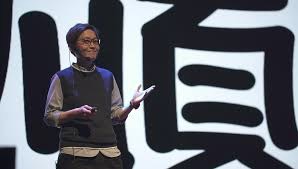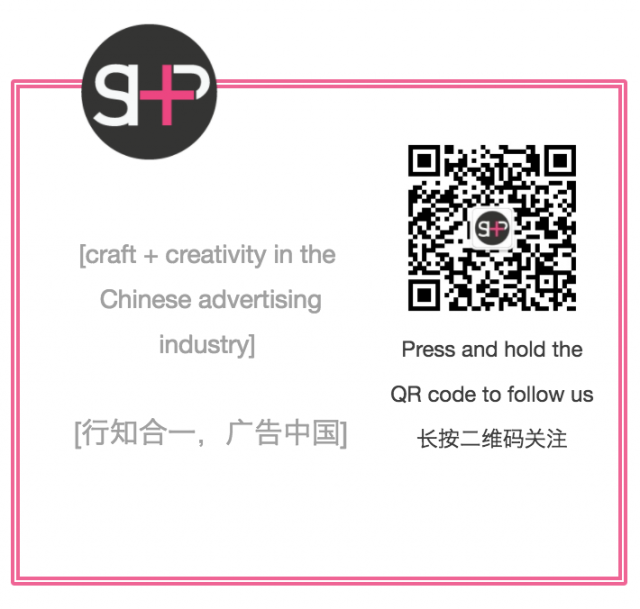As the Cannes Lions Festival of Creativity rolls around for its 65th edition China’s presence at the festival continues to grow in terms of attention, delegate numbers, and sponsorship. For the second year in a row there will be a day dedicated to China related talks.
第65届戛纳国际创意节即将拉开帷幕,中国在戛纳的参与度越来越高,不论是外界关注,还是参与人数,抑或是赞助都如此。去年戛纳第一次专门设立了一整天的中国演讲,今年这一传统还会延续。
Is it that Chinese agencies and brands do not place a high value on foreign awards shows or perhaps there are deeper questions to ask such as how is creativity and innovation different in each country and culture. Could it even be that international award shows like Cannes are fundamentally biased against the type of creative work coming out of new giants like China?
然而,从获奖荣誉来看,虽然中国递交的作品数量不少,广告市场也很巨大,但是获奖数量却不尽如人意。是什么阻碍了中国在国际广告市场的认可度呢?是因为中国广告机构和品牌不够重视国际大奖赛吗?还是要深入挖掘其中的原因?比如说不同国家和文化在创意和创新上有什么不同?甚至,又是不是因为戛纳这样的国际大奖从根本上就对新崛起的中国创新有偏见?
SHP+ has been interviewing creatives on the state of creativity in China. For the next interview we talked with designer Rene Chen, the managing director at Jones Knowles Ritchie’s Shanghai branch office, a global design agency that focuses on brand identity and packaging design campaigns. She spoke at Cannes in 2016 on the topic of creativity in China and two years later she still has an interesting perspective to share about the nature of creativity in China’s advertising market.
SHP+采访了几位创意人士,了解中国的创意发展。这一次受访者是全球化设计公司Jones Knowles Ritchie的上海总经理Rene Chen,她也是一位设计师,该公司专注于品牌识别和设计宣传。2016年戛纳创意节上,Rene做了关于中国创意的主题演讲,如今,两年过去了,她依然有很多话要说,从很有趣的视角谈谈如何定义和理解中国广告市场的创意。

Rene Chen
JKR Managing Director, Shanghai | JKR上海总经理
Photo Credit | 照片: The Drum

1. How is the state of China’s creative industry in comparison with the West or is it even possible to make this comparison? 中国的创意产业跟西方相比如何?或者说二者能否相提并论?
On the one hand I’m very protective of China and believe it is a very creative place but I also think that China’s creative industry has a long way to go. In 2016, I spoke at Cannes Lions about protecting and defending Chinese creativity. My main message was that it is important to distinguish what type of creativity we are talking about; as I see it there are two styles of creativity, innovative creative and adaptive creative; China leans more towards adaptive creative.
一方面,我有一种保护欲,不喜欢说中国的不好,我觉得中国有很多创意,但另一方面,我觉得确实中国还有很长的路要走。2016年,我在戛纳国际创意节上讲了如何保护捍卫中国的创意。我觉得有两种创意,创新性创意和适应性创意;中国其实更多的是第二种。
I would not say China is lacking in creativity rather it understands and works in a different creative way than the Western world. Innovative creative, which the West excels at, is about taking risks; it is about breaking things and being rebellious, this type of behavior is just not in China’s cultural DNA. Take as an example how each culture deals with rain. In China if it rains people stop what they are doing and use this as an opportunity to take a rest and then go back after the rain; whereas in the West when it rains they ask ‘why is it raining’ and ‘what can I do to stop this rain or work through it’. It is like this with creativity, in China it is not about breaking or disrupting things but more about modifying and reshaping. Both methods are very valid forms of creativity, just different ways of approaching the issue.
我觉得中国并不缺少创意,只是跟西方理解运用创意的方式不同而已。创新性创意,是西方擅长的,就是要敢于冒险,要打破常规,有反叛精神,中国的文化基因里没有这种行为。比如说,每个文化对雨的看法都不同。在中国,如果下雨,人们会放下手头的工作,趁机休息,雨停了,再开始工作;但在西方,要是下雨的话,人们就会想,为什么会下雨,怎么能让雨停,或者怎么应对。这就是一种创意,但在中国,人们不想打破事物原有的规律,而是想着如何改变,如何重塑。东西的两种方法都是很坚实的创意形式,只是应对事情的方式不同罢了。
2. Can you elaborate more on your understanding of the difference between creativity and innovation? 能具体说说你是如何理解创意和创新之间的区别吗?
The terms innovation and creativity are frequently mixed up partially because of today’s focus on technological innovations. People have started to equate the two terms with the same meaning as they believe any new technology or innovation is also the product of creativity. I think there is an important distinction between the two, however. Creativity is actually all around us, whereas innovation is something that starts from scratch and is perhaps more closely associated with what we think of as invention. In China we can see creativity even on the street level and almost in a comical way, for example, the motorists that are able to stack so many chairs on the back of their bike, this is one form of creativity. Innovation, on the other hand, is about dreaming up something that is totally new and has never been experimented on before.
创新和创意有部分是混在一起的,因为现在人们都很关注科技创新。人们也开始把两个概念等同起来,因为他们觉得任何新的科技或者产品都是一种创意。但我觉得而这之间还是有很大差别的。创意实际上就在我们身边,无处不在,但是创新是从零开始,或许跟我们所谓的发明是紧密相关的。在中国,我们在大街小巷都可以看到创意,有时候还很有意思,比如说,一个骑摩托的人,后边绑了很多椅子,这其实就是一种创意。而创新,则是有梦想,是全新的,是之前从没有人实验过的。
3. How do you think the creative process in China effects the growth or stagnation of creativity and do you see this process changing here? 你觉得中国的创意流程是否推动或者阻碍了创意的发展,这种创意过程在变化吗?
Let me share some examples that can explain the range of the creative process right now in China. We have a huge international client that we are helping grow in the local China market and so the team we work with here are local Chinese but they are very open minded and have a good sense of where China is in its development stage. This client is great to work with because they are not too proud thinking that it is China’s time to dominate and they are also not overly obsessed with the West, falsely ascribing standards and goals with the term ‘Western’. If we get more clients with this sort of mindset I know that China’s creativity will really shine.
我来举几个例子,解释一下中国现在的创新过程。我们有一个很大的国际客户,我们帮他们开拓中国本土市场,跟我们一起合作的团队其实是中国人,但是他们思想很开放,也很了解中国现在的发展阶段。跟他们合作起来很顺畅,他们不骄不躁,不觉得中国现在要开始主导了,而且也不过分沉迷西方,不会奉西方为标准。如果更多的客户能有这样的思维方式,那中国的创意真的就会大放异彩了。
On the other hand, just this year we are still working with local clients where whether it is the top management that does not appreciate or understand the value of the creative process, or it is the middle management that is overly protective, risk-averse or simply wants to save face, all of these close-minded ways of thinking in the end stifle the creative potential and our results.
另一方面,今年我们还有一些本土客户,要么就是高管不知道如何欣赏理解创意过程的价值,要么就是中层管理者过于保守,不愿意冒险,只想着怎么留住面子,这样的闭塞思维最终只会扼制创意潜力,也会影响我们的成果。
Right now China’s consumers are actually very open and willing to try new products and ideas. I would have to say the issues with China’s creative process lean more towards the clients risk-averse mindset, but I really think this is just a matter of time before this changes too.
现在,中国消费者实际上思想很开放,愿意尝试新事物,这样很好。但不得不说,中国的创意过程,更多的还是客户那种规避风险的思维方式,但是我真觉得改变迟早会到来。
4. Are you optimistic for the future of China’s creative industry? 你对中国的创意产业很乐观吗?
I’m optimistic about the growth of creativity in China but not innovation. I think to answer this question it is important to think about Chinese culture. We are all different in terms of race and culture and in turn we all work and create in different ways. Our differences indeed are what make humanity beautiful, the challenge then is for each culture to understand its strengths and learn how to leverage them. So in the future I actually don’t see China as a very innovative nation but I think it is and can become an even more creative nation than it is today.
我对中国的创意发展很乐观,但是对创新不是很乐观。要想回答这个问题,我们要想想中国的文化。各个国家种族和文化都不同,所以工作方式和创作方式也不同。实际上,差异正是人类的美好所在,每一种文化都要去了解自己的优点,学会如何利用优点。所以实际上我不觉得中国以后会多创新,但是却会有越来越多的创意。





 BAM Music Library Brings Edgy, Indie Sounds to Chinese Creatives
BAM Music Library Brings Edgy, Indie Sounds to Chinese Creatives
